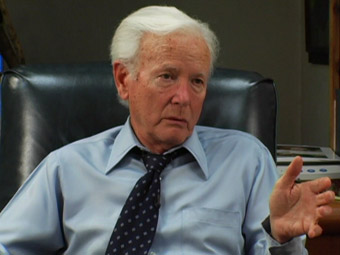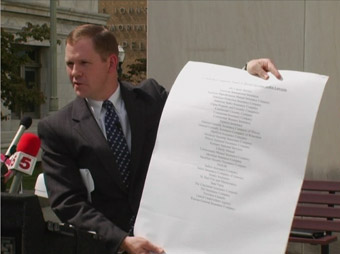"Nothing
sells like fear in America." |
Terry
Lavin, former President of the Illinois State Bar Association |
Not being that familiar with the finer points
of American civil law, I have to admit that until I sat down in front of Wayne Ewing's
Benched: The Corporate Takeover of the Judiciary
I had never encountered the term 'tort'. For those
of you in the same boat, Microsoft Word's inbuilt dictionary
defines it as, "in civil law, a wrongful act for which
damages can be sought by the injured party." That means,
for example, that if you go into hospital and someone screws
up and you are left permenantly damaged in some way, you
have the right to sue them or their organisation for damages.
The level of the award can vary from case to case depending
on its severity, the cost of resulting medical care and
the estimation of the financial recompense for the suffering
caused.
Back
in 2005 in Illinois, a campaign was under way to impose
a cap on the payouts in such cases, to restore some sanity
to a system in which individuals were suing at the drop
of a hat and reaping the financial benefits. This had resulted
in a shortage of medical professionals, who were fleeing
the state to anywhere they would be less likely to find
themselves at the end of an unfair law suit. With shiftless
members of the judiciary in on the deal, the whole situation
was clearly in need of reform.

At least that's the pro-tort reform campaigners would have you believe.
With press stories tending to focus only on more outrageous-sounding
law suits and often misreporting the facts of the case,
it all sounds surprisingly plausible. But is it? The issue
of tort reform proves to be at the centre of a two horse
race for a position in the Illinois Supreme Court between
Democrat Gordon Maag and Republican Lloyd Karmier. Karmier
promotes himself as the friend of the ordinary working man
and woman, keen to protect their access to health care by
putting an end to all these overpriced payouts that are
scaring the doctors away. The pro-reform campaign encourages
everyone to vote for him and puts out ads in which good-looking
doctors and nurses earnestly endorse his candidacy. What
a guy. Except something's not quite right here. People in
Karmier's camp appear strangely reluctant to talk to our
intrepid reporter, the stories about an exodus of medical
professionals may not actually be true, and there's a strong
suspicion that the US Chamber of Commerce have poured millions
of dollars into Karmier's campaign. Now why would they do
that? Well, one of their own contributors is tobacco giant
Phillip Morris, who only recently lost a class action suit
and had a 10.1 billion dollar judgement made against them,
the very sort of big payout our friend Karmier seems keen
to overturn on appeal. Aha...
Boasting
none of the visual pizzazz of some of the more prominent
documentary features of recent years, Benched is shot and edited in the style of a news special and is
presented and narrated by correspondent Paul Johnson. Johnson's
distinctive accent and studied sincerity may initially prove
a small hurdle for a UK audience that is a little too used to seeing such
a reporting style satirised, but his approach is direct and
effective, and when presenting a questionable newspaper
ad at an Illinois State Bar Association press conference,
is tinged with just the right level of sardonic wit. Ewing and Johnson assemble some very persuasive interview
material, including level-headed contributions from former
Illinois State Bar President Terry Lavin, attorney Rex Carr,
Victims and Families United head Doug Wojcieszak, and Joanne
Doroshow from the Centre for Justice and Democracy. The
increasingly unpleasant rivalry between Karmier and Maag
is nicely illustrated by TV ad campaigns that simply wouldn't
be allowed air time in the UK, but it's in the later stages
that the ante is really upped, as the true scale of the
corporate and political self-interest becomes clear and
Karmier's repeated disinterest in participating in the film
mutates into something a tad more unpleasant. Attempting
to film a Republican Party rally, Ewing's camera is repeatedly
blocked by a party goon, who chillingly informs him that
he has no place there because "You are on the street,
but you're not with us."

It
seems doubtful that Ewing and Johnson began their film
from a position of complete neutrality, but I personally
have no problem with that – good reporting more often than
not starts from the suspicion that something stinks and
is driven forward by a determination to locate the source
of that smell, and there is clear evidence here of something
rotten in the state of Illinois. What starts as a seemingly
domestic issue is soon shown to have wider implications,
the clear suggestion of unsavoury corporate practices having
a depressingly familiar ring, and one whose relevance reaches
far beyond Illinois and even America itself to just about
every country in which multi-nationals operate. As British
politicians and companies increasingly embrace the corporate
American model, the film's final message should serve as
a warning of things to come or already taking place, their
participants no doubt keen to avoid their own fifteen minutes
of infamy in the documentary spotlight.
Shot,
I am guessing, on NTSC DigiBeta or similar, the image is
here is framed 4:3 and looks largely fine, with a good level
of detail, solid contrast and no obvious compression artefacts.
The very recognisably video look is not an issue, being
appropriate to the investigate documentary format.
The
soundtrack is similarly pleasing – nothing flashy, but always
clear and some surprisingly good stereo separation in some
of the exteriors.
Case
Study (14:19)
One of the victims of medical negligence who was successful
in his claim for damages but whose scenes did not make the
final cut of the film, Michael was left in a quadriplegic
state and very clearly outlines the financial and emotional
cost of his condition and the difference the settlement,
won for him by attorney Rex Carr, has made to his quality
of life. This is a touching an informative inclusion that
inevitably prompts you to consider how you would cope in
his place.
Wayne
Ewing is something of a cottage documentary film industry,
shooting, editing, producing and directing his films and
the putting out the DVDs himself, selling them through his
own websites. This is the second of his films I have seen
and reviewed (the first was Free
Lisl: Fear and Loathing in Denver, although
I have The Last
Campaign sitting by the TV as I type) and already
the theme that appears to unify the work is a desire to
highlight injustice by the system against the individual.
Benched: The Corporate Takeover of the Judiciary
may not be as well known as several other investigate documentaries
I could name, but it absolutely deserves to be seen by anyone
troubled by the increasingly dominant and sinister nature
of the big corporations, and if you're not then you damned
well should be. This is not an American issue, but an increasingly
global one, and to be informed, frankly, is to be forewarned.
If
you are interested in purchasing the DVD, then you'll need
to do so directly from Wayne Ewing's site at www.benchedmovie.com.
|